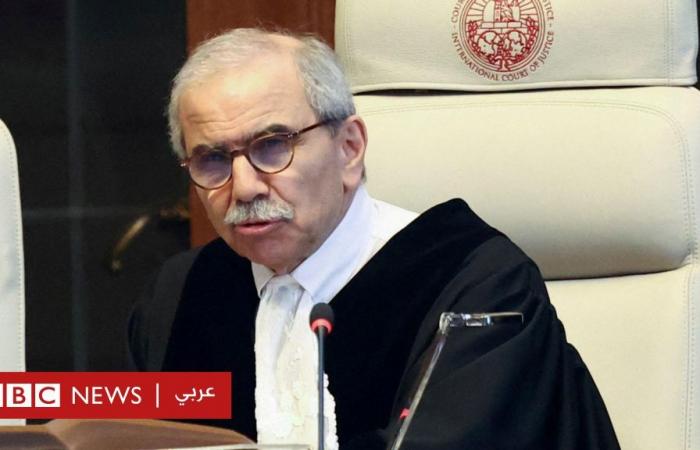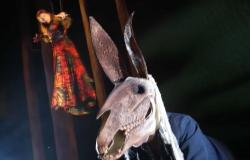image source, Reuters
Last updated 1 hour ago
The Lebanese presidency announced, on Monday evening, that Nawaf Salam had been assigned to form the Lebanese government after he received the greatest support among members of Parliament.
Nawaf Salam nominated 84 deputies, while nine others supported Mikati. 35 deputies did not nominate anyone to head the government, out of 128 deputies included in Parliament.
The Loyalty to the Resistance bloc, which includes Hezbollah representatives, did not name anyone to head the government, according to the Lebanese National News Agency.
In a consistent position, the Development and Liberation Bloc, which includes representatives of the Hezbollah-allied Amal Movement, did not name anyone to head the Lebanese Council of Ministers.
In the last hours, the competition was limited to caretaker Prime Minister Najib Mikati and Salam, the veteran diplomat who currently heads the International Court of Justice in The Hague.
Parliamentary consultations to name a person who would be entrusted with the task of forming a new government began on Monday morning from Baabda Palace overlooking the capital, Beirut, four days after the election of Joseph Aoun as president of the country, after a presidential vacuum that lasted for two years, during which Lebanon witnessed major challenges.
Pending the official result of the second round of binding parliamentary consultations conducted by the Lebanese President, the first round ended with 12 votes for Nawaf Salam, while President Najib Mikati received 8 votes if the vote of Representative Jamil Al-Sayyed Mikati was included, while one vote was recorded without a designation.
Since setting the date for the binding consultations, political forces have circulated the names of a number of candidates for the position held in Lebanon by a figure from the Sunni sect.
Among the candidates are caretaker Prime Minister Najib Mikati, opposition member of Hezbollah Fouad Makhzoumi, and former ambassador Nawaf Salam, whose name is being circulated in recent hours.
After opposition forces, including the Lebanese Forces bloc and other small blocs, announced on Saturday their decision to nominate Representative Fouad Makhzoumi to head the government, opposition and independent representatives announced their support for the nomination of Judge Nawaf Salam, a veteran diplomat who is respected in Lebanon and whose name is put forward during every parliamentary consultation.
After meetings and communications that continued until late Sunday night, Makhzoumi announced on Monday morning his withdrawal from the candidacy for prime minister, on the basis that “the presence of more than one opposition candidate will inevitably lead to the loss of everyone” and to open the way for “consensus” on peace.
This page contains content from Twitter. Your consent is required before viewing any material as it may contain cookies and other technical tools. You may prefer to view Cookie Policy For Twitter And privacy policy Before approval. To view the content, select Agree and Complete
Accept and continue
Warning: The BBC is not responsible for the content of external websites
End of Twitter post
Makhzoumi said through his account on the
Other representatives put forward the nomination of Nawaf Salam, who currently heads the International Court of Justice in The Hague, and is a respected veteran diplomat in Lebanon whose name is raised during every parliamentary consultation.
Therefore, the competition for the presidency of the government is limited to between Mikati and Salam, at a time when attempts have intensified to unify the positions of opposition blocs and independent representatives to move forward with naming Salam, instead of Makhzoumi, to miss the opportunity to reassign Mikati.
The first meetings of President Aoun
President Aoun’s first meetings were with Deputy Speaker of the House of Representatives Elias Bou Saab, followed by Speaker of the House of Representatives Nabih Berri meeting with the “Development and Liberation” bloc.
The Lebanese News Agency revealed that Bou Saab did not name anyone to head the government. He said: “There is hope if we agree to start a new page, but what we see in the presidency of the government and the nominations is different from the atmosphere that was in the election of the President of the Republic.”
He added, “We are concerned that if a team is broken at the expense of a team in the prime minister’s office, it will lead us to a crisis. We hope to agree on a reformist president who will ensure the formation of a government in line with the oath of office. Any candidate for the prime minister’s office must have a clear proposal.”
The first nominations fluctuated between Salam and Mikati, while MP Jamil al-Sayyid said, “If the votes are equal between Mikati and Salam, my vote will be for Mikati. If the votes are not equal, I will not vote for anyone.”
As for MP Fouad Karam, he announced that the “Strong Republic” bloc would vote for Judge Nawaf Salam, after Makhzoumi’s withdrawal, describing Makhzoumi’s decision as “award and courage.”
-Karam stressed that “the Lebanese Forces are in harmony with the opposition’s decision,” and that they will participate in the government and stand alongside the President of the Republic and the Prime Minister “to work to save Lebanon.”
As for the people, the BBC correspondent in Beirut monitors great enthusiasm for Nawaf Salam from large segments because he is considered a figure outside the political class with a very distinguished professional and legal record.
She says that, on the other hand, there are those who also support Mikati, considering that Salam’s arrival is “a complete dedication to what they describe as American and Saudi guardianship of the country.”
image source, EPA
Behind the scenes agreements
The head of the bloc, MP Mohamed Raad, said, “Our meeting with the President of the Republic was to express our regret for those who want to undermine the consensual view of the covenant.”
Raad stated that some are working to exclude and cancel the group, adding that “the group will act calmly and wisely out of concern for the national interest.”
The Loyalty to the Resistance bloc, which includes Hezbollah representatives, did not name anyone to head the government, after a source close to Hezbollah told Agence France-Presse that the party and its ally, the Amal Movement, led by Parliament Speaker Nabih Berri, support the reassignment of Mikati as head of the government.
He explained that renaming it is “part of the agreement reached with the Saudi envoy to Lebanon, Yazid bin Muhammad bin Fahd Al Farhan, which led to Hezbollah moving forward and hoping for Aoun to be elected president” on Thursday, January 9.
Mikati, who previously headed three governments in Lebanon and is considered one of Lebanon’s richest people, denied the existence of any similar agreement.
He said on the sidelines of the president’s election session on Thursday that he was ready “if there is any necessity” to “serve the country.”
Mikati, whose government led the country through more than two years of vacancy in the presidency, during a period in which the economic collapse deepened and witnessed a devastating war between Hezbollah and Israel, has good relations with political forces and enjoys foreign relations with several parties.
Hezbollah’s opponents and those who oppose Mikati’s designation believe that he forms part of the previous political system over which Hezbollah tightened its grip, and that adjusting the balance of political power at home in the wake of the setbacks suffered by Hezbollah requires heading to nominate a new figure.
The leader of the Lebanese Forces Party, Samir Geagea, said last week, “There is a new era that has begun… Whether we like it or not, President Mikati was with the last group.”
According to the Lebanese Constitution, the President of the Republic names the Prime Minister-designate, in consultation with the Speaker of Parliament, after being informed of the results of the parliamentary consultations.
Assigning a new president to form a government does not mean that its birth is imminent. This task often took weeks or even months, due to political divisions and conditions and counterconditions in a country whose system is based on the principle of quotas.
The next government awaits major challenges, most notably reconstruction after the recent war that destroyed parts of the south and east of the country and the southern suburb of Beirut, and the implementation of the ceasefire agreement, which stipulates Israel’s withdrawal from the areas it entered in the south and includes adherence to UN Security Council Resolution 1701 issued in 2006. One of its terms is for Hezbollah to move away from the borders, disarm all armed groups in Lebanon, and limit it to legitimate forces alone.
Another challenge is implementing urgent reforms to accelerate the economy after more than five years of unprecedented collapse.
image source, EPA
Israeli raids and bombing of homes in the south
On the field level, the National News Agency in Lebanon reported that a large Israeli force, reinforced with tanks and vehicles, opened fire on Monday morning and combed the areas of Al-Mafilha and Ras Al-Dhahr, west of the town of Mays Al-Jabal, amid heavy and low air traffic.
The Israeli army also carried out an explosion and bombing of homes in the town of Aita al-Shaab in the Bint Jbeil district, according to what the agency reported.
In the early hours of Monday morning, Israeli aircraft targeted the outskirts of the town of Jinta on the outskirts of the eastern Lebanon mountain range, and also launched 4 raids on the area between Houmin al-Fawqa and Deir al-Zahrati.
The skies over the city of Tire and the villages and towns of the district are witnessing the flight of a reconnaissance plane at low altitude, according to the Lebanese agency.
On Sunday, the Israeli army committed at least 18 violations of the ceasefire in Lebanon, bringing the number of its violations to at least 473 since the start of the ceasefire 48 days ago, according to the National News Agency in Lebanon.






